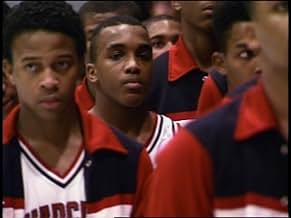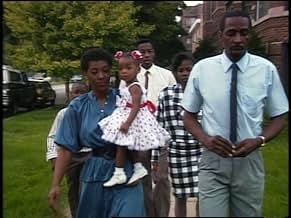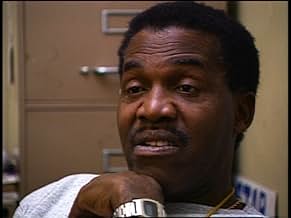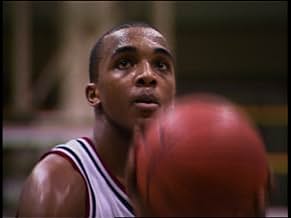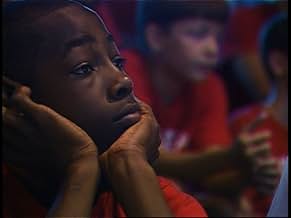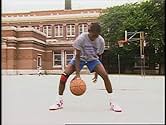A film following the lives of two inner-city Chicago boys who struggle to become college basketball players on the road to going professional.A film following the lives of two inner-city Chicago boys who struggle to become college basketball players on the road to going professional.A film following the lives of two inner-city Chicago boys who struggle to become college basketball players on the road to going professional.
- Nominated for 1 Oscar
- 23 wins & 9 nominations total
Marlyn Hopewell
- Self - High School Guidance Counselor
- (as Sister Marlyn Hopewell)
Featured reviews
"Basketball is a ticket out of ghetto." (William Gates)
"... nobody cares about you. You're a black, you're a young male... The only reason why you're here [Nike training camp] is so you can make their team win. And if the team wins these schools get a lot of money." (Spike Lee)
These phrases, which have persisted as common knowledge among the African-American community during last several decades, have become familiar to the non-hyphenated Americans in the 90s, thanks to the films such as Boyz N the Hood and He Got Game. Among them, Hoop Dreams, a documentary that follows two black youths during a five-year period, is the most objective and the most quiet, but the most powerful statement to represent the disadvantaged youth in urban America.
The film reveals the pattern they follow. Being deluded by the luxurious surface of pro sports, they neglect education and then ending up going nowhere. The community suffers the vicious cycle and their feelings that the system exploits them remain.
Kudos to the filmmakers for their insane amount of work. They must have gone through numerous negotiations to attend and film various scenes, such as family's private events, classrooms, academic counseling, recruiting sessions with college coaches, and surgery operation rooms.
"... nobody cares about you. You're a black, you're a young male... The only reason why you're here [Nike training camp] is so you can make their team win. And if the team wins these schools get a lot of money." (Spike Lee)
These phrases, which have persisted as common knowledge among the African-American community during last several decades, have become familiar to the non-hyphenated Americans in the 90s, thanks to the films such as Boyz N the Hood and He Got Game. Among them, Hoop Dreams, a documentary that follows two black youths during a five-year period, is the most objective and the most quiet, but the most powerful statement to represent the disadvantaged youth in urban America.
The film reveals the pattern they follow. Being deluded by the luxurious surface of pro sports, they neglect education and then ending up going nowhere. The community suffers the vicious cycle and their feelings that the system exploits them remain.
Kudos to the filmmakers for their insane amount of work. They must have gone through numerous negotiations to attend and film various scenes, such as family's private events, classrooms, academic counseling, recruiting sessions with college coaches, and surgery operation rooms.
The filmmakers here show an admirable dedication to their art and to the underprivileged, spending five years tracking two kids, Arthur and William, and their dreams of basketball stardom. The two subjects and their families are simple and somewhat naive, in an endearing way. Their struggles, sometimes unflattering, are put forth for us to relate to, and we all can. Of course this is about two kids and their love for basketball, and about the "road to" that takes place as they try to get there, but it's really about the way people in near-poverty live, the education system and its downfalls, the manipulation of organized sports and tendency for people to try and achieve their goals through others (Arthur's father, William's brother), and the situation between blacks and whites in America. In one scene, Arthur laments being around mainly white kids for the first time in his life, and says it'll be difficult but he'll manage. That kind of relaxed confidence is so rewarding to watch. The film has endless insights into the black urban experience. Of course not every family in the ghetto is in a position where a father is a criminal and drug user, but when two kids in the same story are in that situation, it's got to be somewhat prevalent.
It's the kind of movie that's sustaining, and there are so many transcendent, revealing moments that stand out: Arthur's mother, such an inspirational woman to watch, as she gets her nurse certification; Arthur's family talking to another family in a cafeteria, with his mother high-fiving an elderly white lady; the descent into and path out of drug addiction; and a scene where the man who recruits these boys says that sometimes he has doubts about himself when he sees the pain that's a part of these kids' lives. Spike Lee makes a brief appearance giving a speech to the kids, and his pessimism is the only sore spot in the film.
We don't have to work for any of this, we don't have to question it. There's nothing to clean away before we can get to the real thing. This is the real thing. A curious moment, however, is one scene where Arthur's mother explains to us at one point she had her electricity cut off, which suggests that the crew wasn't there to film that period. But the next scene has her walking in the dark with a lamp, that seems like an undeclared "reenactment" of something they missed, for editing purposes. But the criticism of manipulation in documentaries is tired. Yes, the possibility of tricking an audience into believing something with a documentary is greater, but unless it's political in some respect it doesn't matter. Documentaries are supposed to be presented how the filmmaker sees fit. With no license, we'd have 350-hour documentaries.
At one moment near the end, William's coach says goodbye to him and as he walks out his coach mentions that that's the system: one goes out, another comes in. It feels like we're saying bye to a member of the family. This is a life-affirming experience, a family that should be visited again. 10/10
It's the kind of movie that's sustaining, and there are so many transcendent, revealing moments that stand out: Arthur's mother, such an inspirational woman to watch, as she gets her nurse certification; Arthur's family talking to another family in a cafeteria, with his mother high-fiving an elderly white lady; the descent into and path out of drug addiction; and a scene where the man who recruits these boys says that sometimes he has doubts about himself when he sees the pain that's a part of these kids' lives. Spike Lee makes a brief appearance giving a speech to the kids, and his pessimism is the only sore spot in the film.
We don't have to work for any of this, we don't have to question it. There's nothing to clean away before we can get to the real thing. This is the real thing. A curious moment, however, is one scene where Arthur's mother explains to us at one point she had her electricity cut off, which suggests that the crew wasn't there to film that period. But the next scene has her walking in the dark with a lamp, that seems like an undeclared "reenactment" of something they missed, for editing purposes. But the criticism of manipulation in documentaries is tired. Yes, the possibility of tricking an audience into believing something with a documentary is greater, but unless it's political in some respect it doesn't matter. Documentaries are supposed to be presented how the filmmaker sees fit. With no license, we'd have 350-hour documentaries.
At one moment near the end, William's coach says goodbye to him and as he walks out his coach mentions that that's the system: one goes out, another comes in. It feels like we're saying bye to a member of the family. This is a life-affirming experience, a family that should be visited again. 10/10
Ten years after I first saw this film, based on the mention that Siskel & Ebert made on their show, I am still blown away by it.
A good case could be made for this being the best motion picture of all time. It is simply amazing. The characters (if I can call them that) in the film will astound you with their depth, and this movie will suck you right in... if not to the Cabrini Green projects, at least into the lives of these 2 young men and their families. You will cheer for them, feel their pain, their sadness, their triumphs... and their determination to achieve something better for themselves and their loved ones.
I bought the DVD the day it was released, and can give high praise to the good folks at the Criterion Collection. The accompanying booklet contains 3 excellent essays/articles as well as a complete list of the people in the film. The extras on the DVD are well worth watching, escpecially the commentary from Arthur & William.
To Frederick Marx, Peter Gilbert, and Steve James: Great job, guys. Your dedication to this project, and your understanding of the subject matter (that it was about more than mere basketball, from the beginning) have made a truly excellent film. Thank you.
To Arthur Agee & William Gates: You are both exemplary men, and the example of your lives, your perseverance, your awareness of yourselves and the world you live in, should serve as role models for all of us, regardless of age, color, or income. You are both heroes of mine, and have been for more than 10 years.
To the Agee & Gates families: Thank you for allowing these filmmakers access to your lives for so many years. I have wept at your hardships, and screamed joyously at your triumphs. Your dedication and love for each other is nothing short of inspirational.
If you are reading this and you have not seen this film, PLEASE go get a copy and watch it. You will not have wasted a single minute of your life by having done so.
A truly awesome film.
A good case could be made for this being the best motion picture of all time. It is simply amazing. The characters (if I can call them that) in the film will astound you with their depth, and this movie will suck you right in... if not to the Cabrini Green projects, at least into the lives of these 2 young men and their families. You will cheer for them, feel their pain, their sadness, their triumphs... and their determination to achieve something better for themselves and their loved ones.
I bought the DVD the day it was released, and can give high praise to the good folks at the Criterion Collection. The accompanying booklet contains 3 excellent essays/articles as well as a complete list of the people in the film. The extras on the DVD are well worth watching, escpecially the commentary from Arthur & William.
To Frederick Marx, Peter Gilbert, and Steve James: Great job, guys. Your dedication to this project, and your understanding of the subject matter (that it was about more than mere basketball, from the beginning) have made a truly excellent film. Thank you.
To Arthur Agee & William Gates: You are both exemplary men, and the example of your lives, your perseverance, your awareness of yourselves and the world you live in, should serve as role models for all of us, regardless of age, color, or income. You are both heroes of mine, and have been for more than 10 years.
To the Agee & Gates families: Thank you for allowing these filmmakers access to your lives for so many years. I have wept at your hardships, and screamed joyously at your triumphs. Your dedication and love for each other is nothing short of inspirational.
If you are reading this and you have not seen this film, PLEASE go get a copy and watch it. You will not have wasted a single minute of your life by having done so.
A truly awesome film.
I'll never understand the USA's obsession with high school sports. Putting this much pressure on 14-18 year old kids and calling them athletes and referring to their basketball as a 'career' is harmful. Sure, it's an entertaining game but that's all it is. Once business takes over all bets are off and lives are ruined. The promise of the American dream of wealth and success is nothing but a bald-faced lie. These topics were briefly touched on but for the most part the movie was a rather passive documentary that simply chronicled two different boys' lives in high school basketball for four years. That in itself was interesting enough for me to give this movie a good rating. The people are compelling and it was good to know that eventually at least one of the boys came to realize that his NBA dreams were unrealistic. The movie still presents a powerful portrayal of the lower-class inner city blacks in America and the desperation they have to endure. One of the only outs for their kids seems to be sports scholarships. Enter the over-zealous coach, competitive scouts and legions of fans. It's interesting to see because no one in Canada is as obsessed with high school sports. I think it's mainly because it's the only way out for poor, inner-city blacks in America. The concept makes for an entertaining, emotional documentary.
"Hoop Dreams" brilliantly follows multiple parallel stories, bringing the viewer into the lives of two families of inner-city kids looking for a chance at the "big time", their ticket out of the ghetto. Although the main focus is on William Gates and Arthur Agee, their "supporting cast" is equally enthralling. From William's jaded brother Curtis, sublimating his own basketball aspirations to the reality of his blue-collar mailroom job, to Arthur's indomitable mom Sheila, doing the impossible every day as she keeps her troubled family together, there are a thousand reasons to cheer, laugh, cry, and rage packed throughout this amazing, inspirational, cautionary documentary.
By examining not only the players but also their families and environments, we are given a clearer view of their aspirations and motivations, what they plan to achieve and what they wish to avoid.
I will not summarize or elaborate further. If you have not seen this movie, put it on the short list. 9/10.
By examining not only the players but also their families and environments, we are given a clearer view of their aspirations and motivations, what they plan to achieve and what they wish to avoid.
I will not summarize or elaborate further. If you have not seen this movie, put it on the short list. 9/10.
Did you know
- TriviaAccording to Roger Ebert, after the film failed to receive an Oscar nomination for Best Documentary, he and Gene Siskel learned about the nominating process. He said that members of the Academy's documentary committee held flashlights when they watched documentaries, and anyone who had "given up" could wave it against the screen. The movie was turned off if a majority waved their flashlights. This film was turned off after 15 minutes.
- Quotes
William Gates: That's why when somebody say, "when you get to the NBA, don't forget about me", and that stuff. Well, I should've said to them, "if I don't make it, don't you forget about me."
- Crazy creditsThanks to the St. Joseph High School community and Coach Gene Pingatore who agreed to participate in a not for profit Kartemquin Educational film telling William and Arthur's stories. Today, St. Joseph, with a 39% minority enrollment, remains committed to the dream of a better life for all. Awarding need based financial aid to 40% of its students, St. Joseph with limited resources continues to maintain its academic excellence. A Hoop Dreams Fund has been set up to provide academic scholarships.
- SoundtracksIn This Very Room
Words & Music by Ron & Carol Harris
© 1979 Ron Harris Music (ASCAP)
All Rights Reserved.
All Rights Reserved. International Copyright Secured. Used by Permission.
- How long is Hoop Dreams?Powered by Alexa
Details
Box office
- Budget
- $700,000 (estimated)
- Gross US & Canada
- $7,830,611
- Opening weekend US & Canada
- $18,396
- Oct 16, 1994
- Gross worldwide
- $11,830,611
- Runtime2 hours 50 minutes
- Color
- Sound mix
Contribute to this page
Suggest an edit or add missing content





